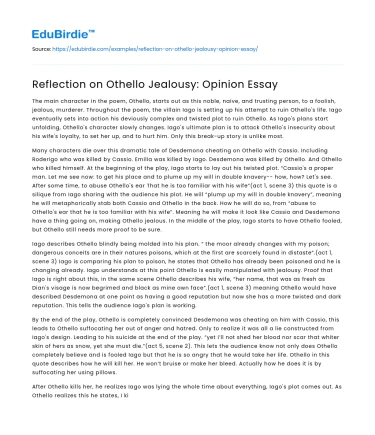The main character in the poem, Othello, starts out as this noble, naive, and trusting person, to a foolish, jealous, murderer. Throughout the poem, the villain Iago is setting up his attempt to ruin Othello's life. Iago eventually sets into action his deviously complex and twisted plot to ruin Othello. As Iago's plans start unfolding, Othello's character slowly changes. Iago's ultimate plan is to attack Othello's insecurity about his wife's loyalty, to set her up, and to hurt him. Only this break-up story is unlike most.
Many characters die over this dramatic tale of Desdemona cheating on Othello with Cassio. Including Roderigo who was killed by Cassio. Emilia was killed by Iago. Desdemona was killed by Othello. And Othello who killed himself. At the beginning of the play, Iago starts to lay out his twisted plot. “Cassio's a proper man. Let me see now: to get his place and to plume up my will in double knavery-- how, how? Let's see. After some time, to abuse Othello's ear That he is too familiar with his wife”(act 1, scene 3) this quote is a silique from Iago sharing with the audience his plot. He will “plump up my will in double knavery”, meaning he will metaphorically stab both Cassio and Othello in the back. How he will do so, from “abuse to Othello's ear that he is too familiar with his wife”. Meaning he will make it look like Cassio and Desdemona have a thing going on, making Othello jealous. In the middle of the play, Iago starts to have Othello fooled, but Othello still needs more proof to be sure.
Save your time!
We can take care of your essay
- Proper editing and formatting
- Free revision, title page, and bibliography
- Flexible prices and money-back guarantee
Iago describes Othello blindly being molded into his plan. “ the moor already changes with my poison; dangerous conceits are in their natures poisons, which at the first are scarcely found in distaste”.(act 1, scene 3) Iago is comparing his plan to poison, he states that Othello has already been poisoned and he is changing already. Iago understands at this point Othello is easily manipulated with jealousy. Proof that Iago is right about this, in the same scene Othello describes his wife, “her name, that was as fresh as Dian's visage is now begrimed and black as mine own face”.(act 1, scene 3) meaning Othello would have described Desdemona at one point as having a good reputation but now she has a more twisted and dark reputation. This tells the audience Iago's plan is working.
By the end of the play, Othello is completely convinced Desdemona was cheating on him with Cassio, this leads to Othello suffocating her out of anger and hatred. Only to realize it was all a lie constructed from Iago's design. Leading to his suicide at the end of the play. “yet i’ll not shed her blood nor scar that whiter skin of hers as snow, yet she must die.”(act 5, scene 2). This lets the audience know not only does Othello completely believe and is fooled Iago but that he is so angry that he would take her life. Othello in this quote describes how he will kill her. He won’t bruise or make her bleed. Actually how he does it is by suffocating her using pillows.
After Othello kills her, he realizes Iago was lying the whole time about everything, Iago's plot comes out. As Othello realizes this he states, I kissed thee ere I killed thee; no way but this; Killing myself, to die upon a kiss. This means Othello kills himself after kissing Desdemona for realizing that he had just killed the love of his wife and that the affair she had with Cassio was all a lie. Othello's character changes throughout the play. In the beginning, he is nice and respectable. But his inability to trust his wife and foolish persona leads to his downfall. As Iago's poison sets into his mind Othello become jealous and petty until it leads to such anger as to where he murders his own wife based on suspensions and paranoia. In the poem, Shakespeare uses dialog from characters to other characters, as well as characters bluntly stating their motives to the audience to transform characters motives and the way the audience perceives such characters, in order to add excitement and entertainment, and emotion to the dramatic tale.






 Stuck on your essay?
Stuck on your essay?

